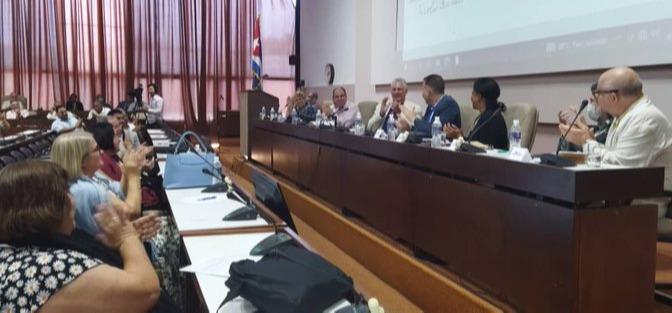
Photo: @PresidenciaCuba
Havana, July 8 (RHC)-- The First Secretary of the Central Committee of the Communist Party of Cuba and President of the Republic, Miguel Díaz-Canel, referred Friday to the declaration of revolutionary principles issued after the debates of intellectuals and artists and described culture as the nation's sword and shield.
From the Palacio de Convenciones in Havana, the president appreciated the promotion of values and the rescue of historical memory from the emergence of new audiovisual productions and acknowledged the work undertaken by members of the Union of Writers and Artists of Cuba (Uneac).
The head of state thanked the contribution of creators, especially in the last two years in the face of the current pandemics: Covid-19, the intensification of the economic, commercial and financial blockade imposed by the United States, the media war and the boycott of events such as the Havana Biennial.
In his speech at the closing of the National Council of Uneac, dedicated to the 120th anniversary of the birth of National Poet Nicolás Guillén (1902-1989), Díaz-Canel highlighted the work of the commissions in the integral formation of citizens and the dissemination of art and traditions in society.
"Socialism saved us during the world epidemiological crisis", said the President of the Republic, and referred that on July 11 the people and the Revolution will celebrate the dismantling of a vandalic coup d'état and considered that the defense of our model will allow overcoming the current economic crisis.
In his opinion, the debates that took place this Friday and the quality of the discussions confirm that the 9th Uneac Congress did not conclude in June 2019, and recalled the systematic meetings of artists, intellectuals and academics with the country's top leadership.
The dignitary argued that the Covid-19 did not paralyze the proposals and initiatives of the institution, "whose thrust was decisive in the recomposition of the spirits", and revealed the long and deep battle undertaken against cultural colonization and its serious historical consequences.
Likewise, he pointed out the importance that the U.S. empire attaches to the cultural war, hence the permanent harassment and the attempts to buy relevant personalities of the Cuban social fabric.
"In the face of this continuous blow to ideas and ways of being in an attempt to win minds and hearts, it is necessary to appeal to the fundamental weapons in the political arsenal of the leader of the Revolution, Fidel Castro: the education of the people and the promotion of critical thinking," he stressed.

